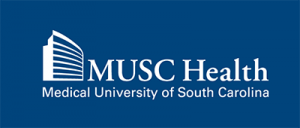MUSC board recognizes COVID-19 efforts to date, receives updates on journey to comprehensive cancer status and year in review highlights
August 15, 2022The Medical University of South Carolina (MUSC) and Medical University Hospital Authority (MUHA) Board of Trustees held their regularly scheduled committee sessions and board meeting on Aug. 11 and 12, respectively. The trustees voted unanimously to reelect James Lemon, D.M.D., as chairman and Charles Schulze as vice chairman for another two-year term.
After 2 1/2 years of leading innovation, treating patients and providing expertise at the state level, related to the COVID-19 pandemic, Lemon formally recognized a group of care team members for their roles in delivering on testing and vaccination efforts across South Carolina.
“These individuals represent an entire team of people who have gone above and beyond to lead us through the COVID-19 pandemic, and we wanted to formally recognize them here today,” Lemon said. “We thank you for your incredible service to MUSC and the state of South Carolina.”
As part of Thursday’s committee meeting schedule, board members visited the MUSC Hollings Cancer Center to learn more about the journey to comprehensive National Cancer Institute (NCI) status. Hollings physician-scientists discussed their research to develop innovative therapies that are more effective, with fewer side effects, and have the potential to treat patients who might not have other treatment options. Board members had the opportunity to tour lab spaces, including the Translational Science Lab, which facilitates the translation of basic science research into the clinic. The board also heard about Hollings’ work in clinical trials and the cancer center’s success in recruiting a demographically representative sample of the state’s population into these important studies. In addition, nurse leaders discussed the increasing volume of patients who need access to care, and the center’s physical therapist discussed an innovative program to integrate physical therapy into cancer care to mitigate some of the side effects of treatment.
David J. Cole, M.D., FACS, MUSC president, provided board members with a year in review report (July 1, 2021 – June 30, 2022) detailing numerous “wins” across the education, research and clinical missions of the institution. Some specific highlights included a consistent, strong showing in several annual U.S. News & World Report “Best of” rankings, the MUSC College of Medicine receiving a full eight-year LCME (Liaison Committee on Medical Education) accreditation, an update on the highly anticipated opening of the new College of Pharmacy, a successful first year for the new MUSC Health-Midlands Division and recent affiliation agreements with Greenwood Genetic Center, Lexington Medical Center and Anderson Regional Medical Center.
“I just wanted to take a moment and provide my heartfelt thanks to our MUSC board and the entire MUSC family for all of the incredible work and support during this past year,” Cole said. “We’ve been able to do three things simultaneously and successfully as an enterprise during the past two years that have set us clearly on a path of growth, transformation and change – we provided care and leadership through COVID; continued our day jobs as a leading academic health system; and, remarkably, charted our course for the future rather than sitting in a state of stasis induced by COVID crisis response. These truths make me very proud of our organization, and the 25,000-plus individuals who have made all of this possible; I doubt many institutions can claim the same progress.”
Kate Azizi, vice president for Institutional Advancement, said that the annual fundraising goal for the enterprise was exceeded, with the team reaching 120% of its $65 million goal, bringing in $78 million for FY 2022. Philanthropic support impacted all areas of the MUSC mission.
“This is due to the incredible generosity of our donors and the engagement of our innovative and expert faculty, researchers, leaders, and clinicians,” she said. “We were also incredibly pleased to exceed our cash goal, breaking a record for the MUSC Foundation. These donations are having immediate, positive impact across MUSC to quite literally change what’s possible for everyone we serve.”
The MUSC/MUHA Board of Trustees serves as separate bodies to govern the university and hospital, normally holding two days of committee and board meetings six times a year. For more information about the MUSC Board of Trustees, visit academicdepartments.musc.edu/leadership/board/index.html.
About MUSC
Founded in 1824 in Charleston, MUSC is the state’s only comprehensive academic health system, with a unique mission to preserve and optimize human life in South Carolina through education, research and patient care. Each year, MUSC educates more than 3,000 students in six colleges – Dental Medicine, Graduate Studies, Health Professions, Medicine, Nursing and Pharmacy – and trains more than 850 residents and fellows in its health system. MUSC brought in more than $327.6 million in research funds in fiscal year 2021, leading the state overall in research funding. MUSC also leads the state in federal and National Institutes of Health funding, with more than $220 million. For information on academic programs, visit musc.edu.
As the health care system of the Medical University of South Carolina, MUSC Health is dedicated to delivering the highest-quality and safest patient care while educating and training generations of outstanding health care providers and leaders to serve the people of South Carolina and beyond. Patient care is provided at 14 hospitals with approximately 2,500 beds and five additional hospital locations in development; more than 350 telehealth sites, with connectivity to patients’ homes; and nearly 750 care locations situated in all regions of South Carolina. In 2022, for the eighth consecutive year, U.S. News & World Report named MUSC Health the No. 1 hospital in South Carolina. To learn more about clinical patient services, visit muschealth.org.
MUSC and its affiliates have collective annual budgets totaling $4.4 billion. The nearly 25,000 MUSC team members include a world-class faculty, physicians, specialty providers, scientists, students, affiliates and care team members who deliver and support groundbreaking education, research and patient care.




















